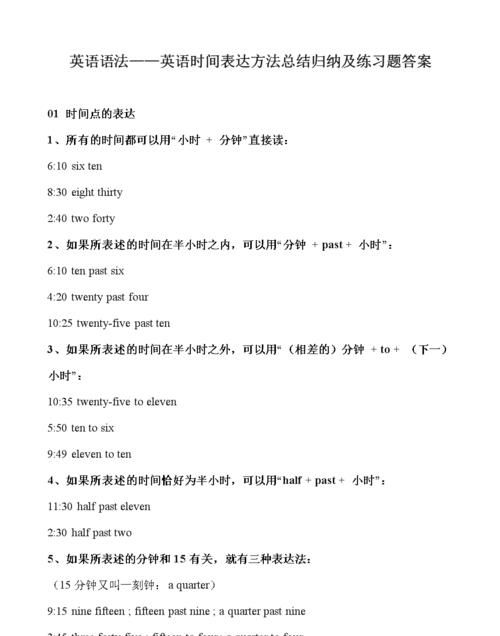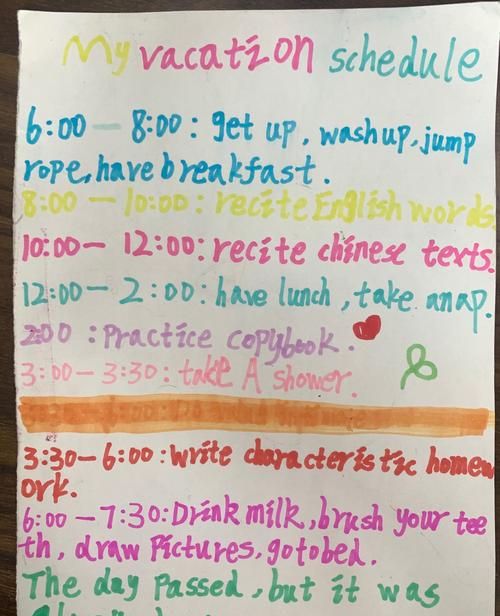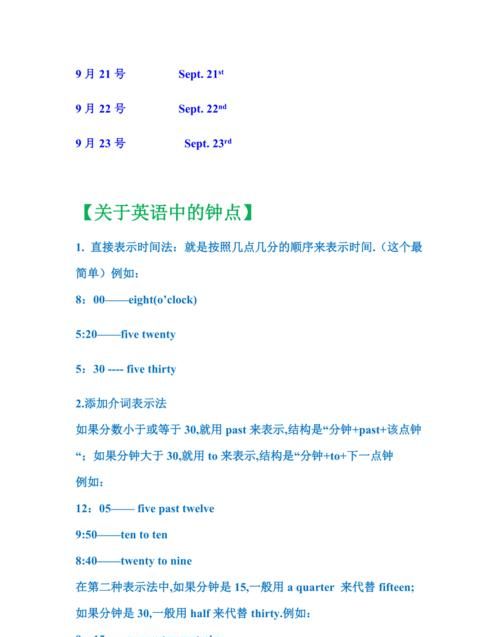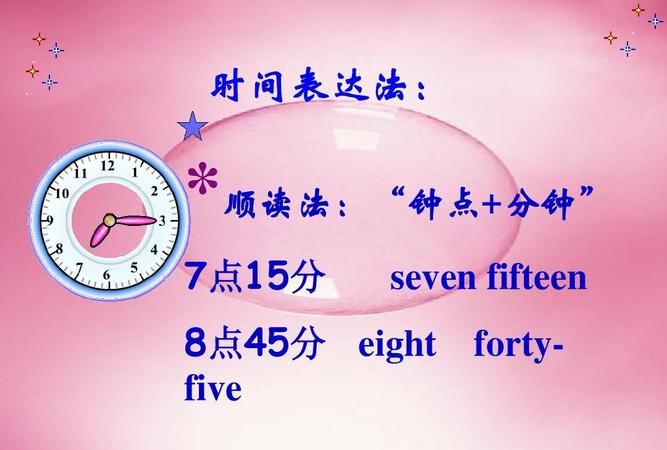本文目录
英语什么是过去式什么是现在进行时
英语的句子表达中心在动词,通过动词的变化能体现很多词语无法表达的内层含义。
动词的过去式是使用在一般过去式的结构中的,也就是句子通过动词使用过去式的形式来表达这个句子叙述的事情是过去某个时间发声的。
现在进行时是动词的一个结构,由am/is/are doing整体构成。现在进行时在句子中使用的时候,并不是在说句子叙述的事情发生的时间,而是在强调句子发生的事件是一种什么状态。

中考英语数词知识点总结
漫长的学习生涯中,大家都背过各种知识点吧?知识点是知识中的最小单位,最具体的内容,有时候也叫“考点”。想要一份整理好的知识点吗?以下是我为大家整理的数词的英语知识点总结,仅供参考,大家一起来看看吧。
数词的英语知识点总结 1
(一)基数词在英语中表示数目的词称为基数词。
1.基数词的构成
(1)1-20
one,two,three,four,five,six,seven,eight,nine,ten,eleven,twelve,thirteen,fourteen,fifteen,
sixteen,seventeen,eighteen,nineteen,twenty
(2)21-99 先说“几十”,再说“几”,中间加连字符。
23→twenty-three,34→thirty-four,
(3)101—999先说“几百”,再加and,再加末两位数或末位数;
586→five hundred and eighty-six,803→eight hundred and three
(4)l,000以上,先从右往左数,每三位数加一个“,”,第一个“,”前为thousand.第二个“,”前为million,第三个“,”前为billion,然后一节一节地表示。
9,785→nine thousand, seven hundred and eighty-five
6,260,309→six million two hundred and sixty thousand three hundred and nine
750,000,000,000→seven hundred and fifty, billion
2.基数词的用法
(1)表示数量
Eg. 一 How many books would you like?
一I would like two.
(2)表示号码
eg.My phone number is 6887789.
(3)表示时间
eg.I watch CCTV News at seven o’clock every evening.
(4)表示“…十”的数词的复数可以表示人的岁数或年代。
eg. He is in his early thirties.他有三十来岁(31—34岁):
This took place in the 1930s.这事发生在二十世纪三十年代;
(5)表具体数字时,hundred,thousand,million用单数。
eg. There are six hundred students in our grade.
(6)表不确定的数字时,数词用复数。若带名词,再加of ,hundreds of(数百,成百上千 的),thousands of(数干,成千上万的),millions of(数百万)
eg 。 Hundreds of old people died of cold last winter.
(二)序数词在英语中表示顺序、次序的词称为序数词。
1.序数词的构成
(1)一般在基数词后加th, eg.four→fourth,thirteen→thirteenth,多位数把个位变序数词。
基数词变为序数词的规则(口诀):
基变序,有规律,词尾加上 th;一、二、三特殊记,结尾t、d、d。
八减t,九减e,f要把ve替。ty把y改为i,记得th前有个e。
2.序数词的用法
(1.)the+序数词,表示“第几”
John lives on the fifteenth floor
(2).aan+序数词,表达"再一,又一"
eg.We'll have to do it a second time.
(3)年月日的表达
年用基数词表示,日用序数词表示
(4)分数的表达
分子用基数词,分母用序数词。分子大于1,分母加-s。
(5)序数词也可以用作副词,
When did you first see him?
(6)基数词也能表示顺序,如书刊的页的数目,住所、房间、教室、电话号码等等。
Page Eight, Room 304,Class Seven,
(7).倍数表示法
主语+谓语+倍数(或分数)+ as + adj. + as I have three times as many as you.
我有你三倍那么多。
(8)在…世纪:
in the twenty-first century
常见考法
对于数词的考查,通常是以单项选择、词语运用或听力形式考查学生在具体语言环境中灵活运用数词的能力。
误区提醒
1.在具体语境中正确使用序数词,并能正确书写序数词。
2.在听力中听辨数字和号码,要速记且准确。
3. hundreds of,thousands of,millions of表示约数时的用法。
典型例题1:In _____,Mr.Li began to learn English.
A.his 1990 B. the 1990s C the 1990 D a 1990
解析:从题意中可判断出要表达时间,如果是1990年,那么直接就是in 1990就可以了, C和D排除掉,人是不可能有1990岁的,排除A,B表达的是“十八世纪 九十年代”。
答案:B
典型例题2: September is _________(九) month of the year.
解析:这是一道填空题,考查序数词的拼写。序数词前加the, 故用the ninth.
数词的英语知识点总结 2
1.数词的种类数词分基数词和序数词
基数词是表示自然数列的词,例如;one,two,three,four…..
序数词是表示先后顺序的词,例如:first,second,third,fourth…
2.基数词和序数词的表示法
(1).基数词单词的拼写:1~12为单词,13~19都以后缀-teen结尾,20至90这样的整十数都以后缀-ty结尾,其他基数词中间加连字符号“-”再按照上述的变化进行。
例:21→twenty-one56--fifty-six85→eighty-five
三位数的构成为:几+百+and+末两位(或末一位)数
例:132→onehundredandthirty-two
205→twohundredandfive
千以上的数字的读法:从后面往前,每三位数作为一个单位,分别为thousand,million.
32,548,652,读作:thirtytwomillion,fivehundredandfortyeightthousand,sixhundredandfiftytwo
(2.)序数词=基数词+th(1、2、3为first,second,third)。但以下情况要注意:
1)fifth(第五),eighth(第八),ninth(第九),twelfth(第十二)
2)以ty结尾的基数词变词尾为tieth
例:twenty→twentieth,ninety→ninetieth
3)复合序数词只需要将相应基数词中最后一位变成序数词,其余不变。
例:第二十一→twenty-first
第二百四十五→twohundredandforty-fifth
基数词序数词的用法
1.hundred,thousand,million与数字连用,表示一定量的具体数字,不用复数,但表示不定概念可用复数
例:threehundredpeople,millionsofpeople
2.基数词表示时刻。五年级英语语法知识点
例:7点seveno’clock,7:20seventwenty
3.给某些事物编号
例:LessOnOne=thefirstlesson
BusNo.2 7月1日=JulyI(JulyIst)
1996年6月3日=June3,1996=Junethethird,nineteenninety-six
4.有关分数表示法。分子是基数词,分母是序数词。当分子大于1时,分母就用复数。
例:I’vereadone-fifthofthebooks.
I’vefinishedthree-fifthsofthewords.
数词的英语知识点总结 3
知识要点
表示“多少”和“第几”的词,叫数词。数词分为基数词和序数词两种。
1)基数词:在十位数词和个位数词中间加上连字符 “ - “ 。如: 21 twenty -one‘基数词三位以上的数词, 在百位和十位之间,一般要用连词"and “。 如: 132 one hundred and thirty-two.
表示”万“的词英语中没有。如1万可用10千来表示。 ten thousand. 30万可用 three hundred thousand 来表示。
基数词的用法:
1.编号的事物用基数词: 如:Lesson Five, Room 101
2.表示”年,月,日“ 时用基数词。
3.表示 “几点钟, 几点过几分” 用基数词。 It is two to two. 现在是两点差两分。
4.加减乘除用基数词。 One plus two is three.一加二等于三。Eight minus four is four. 八减四等于四。
Two times two is four.二乘二等于四.Ten divided by two is five.十除二等于五。
5表示百分数用基数词.
Thirty percent of them is water. 它们当中有30%的'水。
6.表示分数时,分子数字用基数词, 但分母要用序数词, 如分子不是1,序数词要用复数形式。
One-fifth of the books are mine. 三分之一的书是我的。
Three-tenths of water is disappeared. 十分之三的水不见了。
2)序数词:表示数目顺序的词用序数词。
1.序数词1━19 除第一,第二,第三,第五,第八,第九, 第十二变化不规则外, 其余均由在基数词后加上 -th。
2.十位整数的序数词的构成方法是, 是将十位整数基数词的词尾 -y 变成 i 再加 -eth。
3.几十几的序数词,只是把个位数变成序数词, 十位数不变。
4.第一百以上的多位序数词 由基数词的形式变结尾部分为序数词形式来表示。
one hundred and twenty-first ,one thousand,three hundred and twentieth
5.序数词的缩写形式 有时,序数词可以用缩写形式来表示。主要缩写形式有。
first--lst second--2nd third--3rd fourth--4th sixth--6th twentieth--20th twenty-third--23rd 其中lst,2nd,3rd为特殊形式,其它的都是阿拉伯数字后加上th。
6.通常前面要加定冠词 the;但是如果序数词前出现不定冠词a或an时,则表示“再”,“又”.
We’ve tried it three times.Must we try it a fourth time?
7.基数词也可以表示顺序。只需将基数词放在它所修饰的名词之后(名词需大写) 即可,不需要添加定冠词。
the first lesson-Lesson One ,the fifth page-Page 5, the twenty-first room-Room 21
练习请看第二页
1. I‘ve read ______ sports news about the F1 race today.
A. two B. pieces C. two pieces D. two pieces of
2. During World War II, a Jewish(犹太)lady was protected by a local family in Shanghai in her ______.
A. fifties B. fifty C. fiftieth D. the fiftieth
3. The river through our city, which is about _________, is clean again.
A. 6000 meters long B. 6000-metres-long
C. 6000-metre-long D. 6000 meter long
4. I study in Yu Cai Middle School. There are two ____students in our school.
A. thousand B. thousands C. thousand of D. thousands of
5. They said they would have holiday.
A. a two-month B. two months C. two-months D. two-month’s
6.-When was the PLA founded?
-It was founded on ____.
A. July 1. 1921 B. October 1.1949
C. May 1.1922 D. August 1.1927
7. In the past two years, many tall buildings have been built in our city. The tallest is an that stands in the centre.
A. 80-floor building B. 60-floor building
C. 80-floor buildings D. 70 floors building
8.The number of people invited ____ fifty, but a number of them _____absent for different reasons.
A. were ; was B. was ; was C. was ; were D. were ; were
9.- How soon will you finish your work? -In about _______.
A. one and a half month B. one month and a half
C. one and half a month D. a month and half
10.-Would you like some fruit, madam? -Oh, yes. _______, please.
A. 5 kilo bananas B. 5 kilos of bananas
C. 5 kilo of bananas D. 5 kilos of banana
小升初英语专项练习 完形填空及答案1
John sent for a doctor because his wife was ill. He called the doctor and made sure they ___1___ meet at five. He arrived at the doctor’s at twenty ___2___ five. He thought, “ It’s a little bit earlier. I’ll wait for a moment. It’s good ___3___ there on time.”
___4___ he stopped his car in front of the doctor’s. He ___5___ and saw a noisy square not far from here. He went there and sat down on a chair to enjoy the last light of afternoon sun and ___6___ himself quiet. He saw some children playing and some women talking to each other happily.
Suddenly he ___7___ a girl crying. He came up to her and asked some questions. Then he knew she got lost. John tried to find out her ___8___ and took her home. The girl’s parents were very thankful.
Then John hurried to the doctor’s. When the doctor saw him, he was very ___9___ and said, “You’re late. Why did you keep me waiting for twenty minutes?” John said ___10___ except one word—sorry.
1. A. should B. shall C. would D. will
2. A. past B. to C. of D. after
3. A. to arrived at B. to get C. to leave D. to ride
4. A. Every time B. From now on C. Before D. Then
5. A. looked for B. looked after C. looked at D. looked around
6. A. made B. let C. had D. felt
7. A. hears B. was hearing C. heard D. would hear
8. A. name B. school C. age D. address
9. A. polite B. angry C. happy D. kind
10 A. something B. everything C. anything D. nothing
【答案】CBBDDACDBD
小升初英语专项练习 完形填空及答案2
When you are in England, you must be very careful in the streets ___1___ the traffic drives___2___ the left. ___3___ you cross a street, you must look to the ___4___ first and then left.
In the morning and in the evening when people go to or come from work, the streets are very___5___. Traffic is most dangerous then.
When you go by bus in England, you have to be ___6___, too. Always remember the traffic moves on the left. So you must be careful. Have a look first, ___7___ you will go the wrong way.
In many English cities, there are big buses ___8___ two floors. You can sit on the second floor.___9___ there you can see the city very ___10___. It’s very interesting.
1. A. so B. but C. however D. because
2. A. in B. on C. to D. by
3. A. After B. While C. Before D. But
4. A. left B. right C. buses D. front
5. A. busy B. long C. many D. dirty
6. A. safe B. busy C. dangerous D. careful
7. A. and B. or C. because D. when
8. A. with B. in C. on D. for
9. A. On B. From C. Off D. To
10. A. well B. good C. fine D. nice
【答案】DBCBADBABA
小升初英语专项练习 完形填空及答案3
Once there was a boy in Toronto. His name was Jimmy. He started drawing when he was three years old, and when he was five he was already very ___1___ at it. He drew many beautiful interesting pictures, and many people ___2___ his pictures. They thought this boy was going to be ___3___ when he was a little older, and then they were going to ___4___ these pictures for a lot of money.
Jimmy’s pictures were quite different from other ___5___ because he never drew on all of the paper. He drew on ___6___ of it, and the other half was always ___7___.
“That’s very clever,” everybody said. “___8___ other people have ever done that before.”
One day somebody asked him, “Please tell me, Jimmy. Why do you draw on the bottom (底部) half of your pictures, ___9___ not on the top half?”
“Because I’m small,” Jimmy said, “and my brushes (毛笔) can’t ___10___ very high.”
1. A. poor B. sad C. glad D. good
2. A. bought B. brought C. sold D. took
3. A. different B. clever C. famous D. rich
4. A. buy B. show C. leave D. sell
5. A. men’s B. people’s C. boy’s D. child’s
6. A. half B. part C. side D. end
7. A. full B. empty C. wrong D. ready
8. A. No B. Some C. Any D. Many
9. A. then B. and C. but D. or
10. A. change B. turn C. pull D. reach
【答案】DACDBABACD
小升初英语专项练习 完形填空及答案4
Mr Smith lives in the small village, but he works in an office in a big city. He goes to work by train every morning and comes ___1___ the same way.
One morning while he was ___2___ his newspaper on the train, a man ___3___ him came up to him. Mr Smith had not met him before. The man said, “___4___ ” to him and then ___5___ to talk to him. The man said, “Your ___6___ isn’t interesting, is it? You got on the same train at the same station at the same time ___7___ morning and you always sit in the same seat and read the same newspaper.”
When Mr Smith ___8___ this, he put his newspaper down, turned around and ___9___ to the man angrily, “How do you know all that about me?”
“Because I’m ___10___ sitting in the same seat behind you,” the man answered.
1. A. family B. house C. village D. home
2. A. seeing B. look C. reading D. finding
3. A. before B. behind C. beside D. next to
4. A. Sorry B. Thanks C. Hello D. Goodbye
5. A. refused B. stopped C. ordered D. began
6. A. life B. work C. office D. child
7. A. one B. every C. this D. yesterday
8. A. heard B. listened C. found D. felt
9. A. asked B. said C. told D. talked
10. A. never B. hardly C. always D. sometimes
【答案】DCBCDABABC
小升初英语专项练习 完形填空及答案5
On Christmas Eve a few days ago, an English couple, the Hardens, got a very special call. It was only a 20-second call but it was very ___1___. The Hardens’ 15-year-old daughter has gone ___2___ six months before. On Christmas Eve she rang them. “I’m phoning to wish you a happy Christmas, ” she said, “I love you.”
Ronals and Edwine Harden were so ___3___ that they started a special telephone service(服务)called “Alive and Well”. The service helps ___4___ to get in touch with children who have run away from home.
Young people can phone “Alive and Well” and leave a message for their parents. The telephone are answered by answering machines. So ___5___ can speak to the child or make him return home. Parents of runaway children who are ___6___ eighteen can ask the police to bring their children home. So children do not want to tell their parents where they are. Through “Alive and Well” they can telephone their parents and they do not ___7___ about this or giving out their addresses.
The Hardens and their helpers ___8___ the telephone messages and connect(联系)the addresses given. About 30,000 British teenagers have left home and many of them are probably in ___9___. For only two pence(便士)they can go into a telephone coin box and call their parents. They can dial 5675339 and ___10___ a parent's worry: Is he dead or alive?
1. A. interesting B. important C. difficult D. exciting
2. A. away B. out C. back D. along
3. A. angry B. happy C. sad D. kind
4. A. teachers B. people C. parents D. friends
5. A. someone B. anyone C. everyone D. no one
6. A. at B. above C. over D. under
7. A. think B. worry C. talk D. hear
8. A. ask for B. listen to C. look up D. write down
9. A. Paris B. Tokyo C. London D. New York
10. A. stop B. make C. feel D. leave
【答案】BABCDDBDCA

pep小学英语句型大全
pen 钢笔
pencil 铅笔
pencil-case 铅笔盒
ruler 尺子
eraser 橡皮
crayon 蜡笔
book 书
bag 书包
sharpener 卷笔刀
school 学校
head 头
face 脸
nose 鼻子
mouth 嘴
eye 眼睛
ear 耳朵
arm 胳膊
finger 手指
leg 腿
foot 脚
body 身体
red 红色的
yellow 黄色的
green 绿色的
blue 蓝色的
purple 紫色的
white 白色的
black 黑色的
orange 橙色的
pink 粉色的
brown 棕色的
dog 狗
monkey 猴子
panda 熊猫
rabbit 兔子
duck 鸭子
pig 猪
bird 鸟
bear 熊
elephant 大象
mouse 老鼠
squirrel 松鼠
cat猫
cake 蛋糕
bread 面包
hot dog 热狗
hamburger 汉堡包
chicken 鸡肉
French fries 榨薯条
Coke 可乐
juice 果汁
milk 牛奶
water 水
tea 茶
coffee 咖啡
two 二
three 三
four 四
five 五
six 六
seven 七
eight 八
nine 九
ten 十
doll 玩具娃娃
boat 小船
ball 球
kite 风筝
balloon 气球
car 小汽车
plane 飞机
boy 男孩 girl 女孩teacher 教师student 学生this 这个my 我的friend 朋友I’m=I am 我是nice 好的;愉快的good morning 早上好good afternoon 下午好meet 遇见;碰见goodbye 再见too 也;太
Unit 2
father 父亲;爸爸dad 爸爸(口语)mother 母亲;妈妈mom 妈妈(口语)man 男人woman 女人grandmother (外)祖母grandma (口语)(外)祖母grandfather (外)祖父grandpa (口语)(外)祖父sister 姐妹brother 兄妹let’s=let us 让我们great 太好了really 真地;确切地and 和;并且how 多么;怎么样
Unit 3
eleven 十一twelve 十二thirteen 十三fourteen 十四fifteen 十五sixteen 十六
seventeen 十七eighteen 十八nineteen 十九twenty 二十how many 多少
can 能够;可以look at 看;瞧
Unit 4
peach 桃pear 梨orange 橙子watermelon 西瓜apple 苹果banana 香蕉
strawberry 草莓grape 葡萄like 喜欢some 一些;某些thanks 多谢
Unit 5
bus 公共汽车bike 自行车taxi 出租车jeep 吉普车desk 课桌
chair 椅子walkman 随身听lamp 台灯your 你的;你们的zoo 动物园
Unit 6
small 小的big 大的long 长的short 短的;矮的tall 高的giraffe 长颈鹿
deer 鹿
PEP四年级上册四会单词词汇表
Unit 1
computer(计算机) board(写字板) fan(风扇) light(灯) this(这;这个) is(是)
my(我的) that(那;那个) your(你的) teacher’s desk(讲台) picture(图画;照片) wall(墙壁) floor(地板) yes(是;是的) it(它)
Unit 2
one(一) two(二) three(三) four(四) five(五) six(六) seven(七) eight(八) nine(九) ten(十) what(什么) time(时间) it’s=it is …o’clock(…点钟) math(数学) Chinese(语文) English(英语) P.E.(体育) music(音乐) for(为;给) class(课程)
Unit 3
jacket(夹克衫) shirt(衬衫) skirt(裙子) dress(连衣裙) T-shirt(T恤衫) red(红色的) blue(蓝色的) yellow(黄色的) green(绿色的) white(白色的) no(不;不是) not(不;不是的) colour(颜色)
Unit 4
warm(暖和的) cold(寒冷的) cool(凉爽的) today(今天) jeans(牛仔裤) pants(长裤) socks(袜子) shoes(鞋子) let’s=let us play(玩;踢) football(足球) snowy(下雪的) sunny(晴朗的)
2 小学全部英语单词
Unit 5
how much(多少钱) big(大的) small(小的) long(长的) short(短的) apple(苹果) banana(香蕉) pear(梨) orange(橙子) watermelon(西瓜) are(是)
they 它(他、她)们
Unit 6
horse(马) aren’t=are not cat(猫) rabbit(兔子) pig(猪) duck(鸭子) dog(狗) eleven(十一) twelve(十二) thirteen(十三) fifteen(十五) twenty(二十) how many(多少) there(那儿;那里)
PEP四年级下册四会单词词汇表
Unit 1
computer(计算机) board(写字板) fan(风扇) light(灯) this(这;这个) is(是)
my(我的) that(那;那个) your(你的) teacher’s desk(讲台) picture(图画;照片) wall(墙壁) floor(地板) yes(是;是的) it(它)
Unit 2
one(一) two(二) three(三) four(四) five(五) six(六) seven(七) eight(八) nine(九) ten(十) what(什么) time(时间) it’s=it is …o’clock(…点钟) math(数学) Chinese(语文) English(英语) P.E.(体育) music(音乐) for(为;给) class(课程)
Unit 3
jacket(夹克衫) shirt(衬衫) skirt(裙
子) dress(连衣裙) T-shirt(T恤衫) red(红色的) blue(蓝色的) yellow(黄色的) green(绿色的) white(白色的) no(不;不是) not(不;不是的) colour(颜色)
Unit 4
warm(暖和的) cold(寒冷的) cool(凉爽的) today(今天) jeans(牛仔裤) pants(长裤) socks(袜子) shoes(鞋子) let’s=let us play(玩;踢) football(足球) snowy(下雪的) sunny(晴朗的)
Unit 5
how much(多少钱) big(大的) small(小的) long(长的) short(短的) apple(苹果) banana(香蕉) pear(梨) orange(橙子) watermelon(西瓜) are(是)
they 它(他、她)们
Unit 6
horse(马) aren’t=are not cat(猫) rabbit(兔子) pig(猪) duck(鸭子) dog(狗) eleven(十一) twelve(十二) thirteen(十三) fifteen(十五) twenty(二十) how many(多少) there(那儿;那里)
PEP五年级上册四会单词词汇表
Unit 1
Young (年轻的) funny (滑稽可笑的) tall (高的)
strong (强壮的) kind (和蔼的、亲切的) old (年老的) short (矮的)thin (瘦的) Mr (先生) like (像、喜欢) strict (严格的) smart (聪明的、巧妙的) active (积极的、活跃的) quiet (安静的、文静的)very (很、非常) but (但是)
Unit 2
Mondy (星期一) Tuesday (星期二) Wednesday (星期三) Thursday (星期四) Friday (星期五) Saturday (星期六) Sunday (星期天) day (天) have (有、吃) on (在…..时候) do homework (做作业) watch TV (看电视) read books (读书)
Unit 3
eggplant (茄子) fish (鱼) green beans (青豆) tofu (豆腐) potato (土豆) tomato (西红柿) for (为) lunch (中餐) we (我们) tasty (好吃的) sweet (甜的) sour (酸的) fresh (新鲜的) salty (咸的) favourite (最喜欢的) they are (他们是) fruit (水果) grape (葡萄)
Unit 4
Cook the meals (倒垃圾) water the flowers (浇花) sweep the floor (扫地) clean the bedroom (打扫卧室) make the bed (铺床) set the table (摆饭桌)wash the clothes (洗碗碟) do the dishes (收拾衣服) use a computer (使用计算机
Unit 5
curtain (空调) trash bin (垃圾箱) closet (壁橱) mirror (镜子) end table (床头柜) bedroom (卧室) kitchen (厨房) bathroom (卫生间) living room (客厅) in (在…里面) on (在…上面) under (在…下面) near (在..旁边) behind (在…后边) clothes (衣服)
Unit 6
river (河流) flower (花) grass (草) lake (湖泊) forest (森林) path (路) pake (公园) picture (照片) hourse (房子) bridge (桥) tree (树) road (公路) building (建筑物) clean (干净的)
3 小学全部英语单词
PEP五年级下册四会单词词汇表
Unit 1
do morning exercises(晨练) eat breakfast(吃早饭) have english class(上英语课) play sports(进行体育运动) eat dinner(吃晚饭) when(什么时候) evening(夜晚;晚上) get up(起床) at(在……点钟) usually(通常;一般) noon(中午) climb mountains(爬山) go shopping(购物;买东西) play the piano(弹钢琴) visit grandparents(看望祖父母) go hiking(去远足) weekend(周末) often(经常) sometimes(有时候)
Unit 2
spring(春天) summer(夏天) fall(秋天) winter(冬天) season季节) which(哪一个) best(最;极) swim(游泳) fly kites(放风筝) skate(滑冰;滑冰鞋) make a snowman(堆雪人) plant trees(种树) why(为什么) because(因为) sleep(睡觉)
Unit 3
Jan./January(一月) Feb./February(二月) Mar./March(三月) Apr./April(四月) May(五月) June(六月) July(七月) Aug./Augest(八月) Sept./September(九月) Oct./October(十月) Nov./November(十一月) Dec./December(十二月) birthday(生日) uncle(叔叔;舅舅) her(她的) date(日期)
Unit 4
draw pictures(画画)cook dinner(做饭) read a book(看书)answer the phone(接电话) listen to music9(听音乐) clean the room(打扫房间) write a letter(写信)write an e-mail(写电子邮件) mom(妈妈)grandpa(爷爷;外公)study(书房)
Unit 5
fly(飞) jump(跳) walk(走) run(跑) swim(游泳) kangaroo(袋鼠) sleep(睡觉) climb(往上爬) fight(打架) swing(荡;荡秋千) drink water(喝水)
Unit 6
take pictures(照相) watch insects(观察昆虫) pick up leaves(采摘树叶) do an experiment(做实验) catch butterfly(捉蝴蝶) honey(蜂蜜) count insects(数昆虫) collect leaves(收集树叶) wtite a report(写报告) play chess(下棋) have a picnic(举行野餐)
PEP六年级上册四会单词词汇表
Unit 1
by (经,乘) foot(脚) bike(自行车) bus(公共汽车) train(火车) how(怎样) go to school(上学) traffic(交通) traffic light(交通灯) traffic rule(交通规则) stop(停,停车站)wait(等待) get to(到达)
Unit 2
library(图书馆) post office(邮局) hospital(医院) cinema(电影院) bookstore(书店) where(在哪里,到哪里) please(请) next to(与…相邻) turn(转弯) right (右边) left(左边) straight(成直线地) then (然后)
Unit 3
next week(下周) this morning(今天上午) this afternoon(今天下午) this evening (今天晚上) comic book(漫画书) post card(明信片) newspaper(报纸) buy(购买)
Unit 4
hobby(爱好) ride a bike--riding a bike(骑自行车) dive--diving(跳水) play the violin—playing the violin(拉小提琴) make kites—making kites(制作风筝) collect stamps—collecting stamps(集邮) live –lives(居住) teach--teaches(教) go--goes(去) watch--watches(看) read--reads(读,看) does doesn’t=does not
Unit 5
singer(歌唱家,歌手) writer(作家) actor(男演员) actress(女演员) artist(画家) TV reporter(电视台记者) engineer(工程师) accountant(会计) policeman(男警察) salesperson(销售员) cleaner(清洁工) where(在哪里,到哪里) work(工作)
Unit 6
rain(雨) cloud (云) sun(太阳) stream(河,溪) come from(来自,从…来) seed(种子) soil(土壤) sprout (苗,芽) plant(植物,种植) should (应该) then(然后)
PEP六年级下册四会单词词汇表
Unit 1
tall—taller更高的 short—shorter 更矮的 strong—stronger 更强壮的 old—older 年龄更大的 young—younger 更年轻的 big—bigger 更大的heavy—heavier 更重的 long—longer 更长的 thin—thinner 更瘦的 small—smaller (体型)更小的
Unit 2
have a fever 发烧 have a sore throat喉咙疼 have a cold感冒 have a toothache 牙疼 have a headache 头疼 matter事情,麻烦 sore 疼的 hurt疼痛 nose 鼻子 tired疲劳的,累的 excited兴奋的 angry生气的 happy高兴的 bored无聊的,烦人的 sad 忧伤的,悲伤的
Unit 3
watch—watched 看 wash—washed 洗 clean—cleaned打扫 play—played玩 visit—visited 看望 do—did last weekend 上一个周末 go—went去 go to a park—went to a park 去公园 go swimming—went swimming去游泳 go fishing—went fishing去钓鱼 read—read 读 go hiking—went hiking 去郊游
Unit 4
leran Chinese—learned Chinese学汉语 sing and dance—sang and danced 唱歌和跳舞 eat good food—ate good food吃好吃的食物 take pictures—took pictures 照相 climb—climbed 爬 have—had buy presents—bought presents买礼物 row a boat—rowed a boat 划船 see elephant—saw elephant 看大象 go skiing—went skiing 去滑雪 go ice-skating—went ice-skating 去滑冰 how怎么,如何 get—got 到达 last 上一个的,仅余的,留在最后的

英语五年级作文
第一单元:
1、以字母y结尾的名词变复数,如果字母y的前面是元音(a, e , i, o, u),就在y后面直接加s。如:boy—boys. 如果字母y前面是辅音,则把y变为i, 再加es. 如:lady—ladies city—cities story--stories.
2、动词的第三人称单数:(所谓第三人称单数,就是指既不是你也不是我的另外一个人,可以是具体的人名,他,她,或它,也可以是称呼类,如my mother, my friend等。当一个句子中的人物是第三人称单数,并且这个句子又是一般现在时态时,该句子中的动词要使用第三人称单数形式。)
have—has like—likes do—does go—goes watch--watches
3、词语变化:fun(形容词形式)――funny funny(名词形式)――fun know(同音词)――no
he(宾格形式)---him
反义词:tall—short long—short young—old new—old strong—thin fat—thin
kind—strict active—quiet
4、be like与do like: 在本单元中,What’s …like?的句型是主句型,这里的like是“像…一样”的意思. What’s …like?是问某某长得什么样子,同学们千万别和like的另一个意思“喜欢”相混了。它的答语一般用:He/She/ It is…(后面跟描写人的外貌特征的词语),如:What’s your father like?你爸爸长得什么样子?。而在do like的句子中,like的意思才是“喜欢”的意思。如:What does your father like? 你爸爸喜欢什么?
第二单元:
1、当询问别人喜欢哪些课程时,classes应当用复数形式,因为别人喜欢的课程可能不止一门。What classes do you like? 你喜欢哪门课程?
2、表示星期几的七个单词,开头第一个字母都要大写。其简写形式为前三个字母加点。
week 星期,周。(一周包括七天)
How many days are there in a week? There are 7.一个星期有几天?七天。
Weekend周末(包括周六和周日)
How many days are there in a weekend? There are 2.一个周末有几天? 2天。
在英语国家中,一个星期的第一天是星期天Sunday. The first day of a week is Sunday.
3、当介词in, on ,at 后面跟表示时间的词语时,表示在某年或某月(当只有年和月的时候),用in.如 in May在五月。In 1988,在1988年。表示在某段时间,如在上午,下午,晚上也用in.如in the morning, in the afternoon, in the evening. 表示在某日,在星期几时,用on。如on Monday, on Sunday . 表示在几点几分,在具体时间时,用at. 如at 6:30, at 9 o’clock.
4、近义词:often(经常)—usually(常常,通常)
5、play with 和…在一起,with后面常用人称代词的宾格形式。 如:I can play ping-pong with you.我可以和你一起打乒乓球。
6. I like Mondays. John likes Sundays. 这里的likes是like的三单形式,在一般现在时的句子中,如果主语是第三人称单数,注意动词要变成三单形式。
7、Today is Sunday. I like Sundays. 在这个句子中,前一个星期日Sunday是特指“今天是星期一”,所以用单数形式,而后一个星期日Sundays是泛指所有的星期日,所以用复数形式。
第三单元:
1、What would you like for lunch? 你午饭想吃什么?“for”:为了。后面要接名词或人称代词的宾格形式。 如:I’d like some tomatoes and mutton。我想吃一些西红柿和羊肉。
2、some与any的区别:
(1)巧记:肯定句中用 some,请求邀请委婉时,some 用于疑问句;
否定疑问用 any, 肯定句中用 any,任何一个接单数。
(2)它俩都是“一些”的意思,后面既可接可数名词复数,又可接不可数名词,但用法有区别。
some 用于肯定句。但当表示请求、邀请、语气委婉,希望对方得到对方肯定回答时,可用于疑问句,此时句中常出现情态动词 can, may, could, would. any 用于否定句和疑问句。 如:
A:Could I have some meat?
B:Sorry, you can't have any meat. There isn't any.
(3)如果名词前有冠词、指示代词、物主代词等限定词修饰时,则只能用 some of,表示“……中的一些。
Some of the apples are hard to reach.
Some of your teachers are not young.
(4)注意:
any 也可用在肯定句中, 此时后面接可数名词的单数, 意为 “任何一个”。如:
You can ask any student in our class.
You can choose any subject.
3、I have eggplant and tomatoes for lunch. 我午饭吃茄子和西红柿。
这里的eggplant是指一道菜,是被切碎了的,熟的,所以这里的eggplant是不可数名词,不能用复数形式。
一日三餐的英语说法: breakfast 早饭 lunch 午饭 dinner 晚饭
西红柿tomato 和土豆potato在指一道菜的时候,一定要用复数形式。
如:I have tomatoes and potatoes for lunch on Mondays .
4、下列单词的形容词形式:
salt― salty(咸的) health― healthy(有用的) taste― tasty(好吃的)
5、同义词:have to (不得不)---must(必须)
同义句: What’s your favourite food? ==Which food do you like best?
6、What’s your favourite food?后面一般跟表示集合的名词,如:food食物 fruit 水果 drink饮料 colour颜色 class课程 book书 sport运动 vegetable蔬菜 animal动物number数字 day天,日子
第四单元:
1、当你想询问别人会干什么时, 用What can you do? 答句有肯定形式:Yes, I can . 否定形式:No, I can’t.
当你想知道他人会干什么时,可用What can he do ? 或者What can she do ? 答句有肯定形式:Yes, he can ./ Yes, she can. 否定形式:No, he can’t./No, she can’t.
2、I can …变为一般疑问句:Can you …? He can…或She can …变为一般疑问句:Can he …/ Can she …? 其中的he , she 也可以变为其他具体的人物。如 My mother can cook the meals. 变为一般疑问句:Can your mother cook the meals?
3、help (形容词形式)――helpful helpful (动词形式)――help
4、当句子中出现了助动词can或其否定形式can’t时,其他的动词要用原型。
第五六单元:
1、There be 句型包括There is a …句型和there are …句型两种。There is a …句型表示有一个,后面跟名词单数。如There is a mirror on the wall.
There are …句型表示有多个,后面一般接具体数字或some , many,再后面跟名词复数,如 There are two end tables near the bed.
There be 句型又叫存在句型,它一般表示在某地有某物。在翻译中文句子时,一般情况下,只要中文句子表达的是“存在”性质的“有”,就要用there be 句型来翻译。如:有一个垃圾桶在门的后面。There is a trash bin behind the door.
There be 句型和一般句型可以相互转换。如:
(1) 把下列句子用There be 句型改写:
The computer is on the desk.
――There is a computer on the desk.
(2) 把下面的句子改为一般句型。
There is a mirror over the bed.――
The mirror is over the bed.
2、There be 句型中使用单数句式还是复数句式遵循就近原则。即离There 最近的名词是单数时用There is a ….离There 最近的名词是复数时,用There are …,不管最后面的名词是单词还是复数,都不去管它,如:
(1)有一个讲台和许多课桌在教室里。There is a teacher’s desk and many desks in the classroom.
(2) 有许多课桌和一个讲台在教室里。There are many desks and a teacher’s desk in the classroom.
3、on 与over的区别:on 在…上面。表示与下面的物体互相接触,紧挨着。
over在…上面,表示与下面的物体不接触,两个物体之间有一定的距离。
20、There be 的单数形式在变为一般疑问句时,将助动词be提前,与there交换位置,如句中有第一人称代词,变为第二人称,将句末的句号变为问号,其他不变。如:There is a closet near the bed.----Is there a closet near the bed?
There is a river in my village.----Is there a river in your village?
There be 的复数形式在变为一般疑问句时,将助动词be提前,与there交换位置,然后将句中some或many变为any, 如句中有第一人称代词,变为第二人称,再将句末的句号变为问号,其他不变。
如:There are some fish in the river.----Are there any fish in the river?
4、There be 句型表示“有”和have, has表示“有”的区别:
There be 句型表示“有”的意思,表示在某个地方有什么,它表示的一种存在。如:There is a bag on the desk. 有一个书包在课桌上。
There are many book on the desk. 有许多书在课桌上。
Have, has 表示“有”的意思,表示一种占有,拥有的关系,一般表示某人有某物。当主语人称是第三人称单数时用has, 其他时候用have.如:
I have a new pen. 我有一支新钢笔。
He has a big schoolbag. 他有一个大书包。
5、示在树上时,in 与on 的不同用法:
当表示人或其他动物在树上时,用in. 当表示树本身的东西如树叶、果实在树上时,用on。如:The bird is in the big tree and the apple is on the small tree.
6、一些特殊疑问词的意义与用法:
(1)what什么,用来问是什么,叫什么,干什么,什么样等。如:What is this? 这是什么? What’s your name? 你叫什么名字? What’s your father like?你爸爸长得什么样子? What’s your mother?你妈妈是干什么的?
(2)Where哪里,用来问在什么地方。如Where are you from?你来自哪里? Where is my ruler?我的尺子在哪里?
(3)Who谁,用来问人物是谁?如:Who’s that man?那个男人是谁?
Who’s your math teacher? 你的数学老师是谁?
(4)Whose 谁的,用来问东西是谁的。如:Whose book is this? 这是谁的书? Whose father is a farmer?谁的爸爸是农民?
Whose bike is blue?谁的自行车是蓝色的?
(5)What time什么时间。用来问具体时间是几点。
如:What time is this?现在几点了?
(6)What colour什么颜色。用来问物体是什么颜色的。
如:What colour is your bag?你的书包是什么颜色的?
(7)When 什么时候。用来问时间,后面常跟动词。
如:When do you get up?你什么时候起床?
(8)How 怎么样。用来问人的身体状况。
如:How are you? 你好吗?
How is your mother?你妈妈好吗?
(9)How many多少.用来问物体的数量。
如:How many books do you have?你有多少本书?
How many days are there in a week?
一个星期有几天?
(10)How much 多少钱。用来问商品或物体的价格。
如:How much is your schoolbag?你的书包多少钱?
How much is this book?这本书多少钱?
(11)Which哪一个。用来问具体的哪一个。
如:Which class do you like best?你最喜欢哪一门课程?
Which Class are you in ?你在哪个班级?I am in Class two.我在二班。
Which Grade are you in ?你在哪个年级?I am in Grade six。我在六年级。
Which Grade is your sister in ? 你妹妹在哪个年级?
She is in Grade 4.她在四年级。
(表示年级或班级的单词Grade, Class在答语中必须大写第一个字母。)
7、以系动词be( am , is , are ) 和助动词can , do等开头的一般疑问句,在答语中首先要用 yes或no做出正误判断,后面必须出现问句开头的系动词或助动词,当问句中出现第一人称代词时,还要变为第二人称。
如: Are you a student? Yes, I am. (No, I am not.)
Is your sister a teacher? Yes, she is. ( No, she isn’t.)
Am I a teacher? Yes, you are. ( No, you aren’t.)
Do you have new teachers? Yes, we do. ( No, we don’t.)
Does Amy have new teachers ? Yes, she does. (No, she doesn’t.)
Can you wash the clothes? Yes, I can. (No, I can’t.)
Can your brother set the table? Yes, he can. (No, he can’t.)
Can your friend make the bed? Yes, she can. ( No, she can’t)

以上就是关于五年级英语时间表达 ,英语什么是过去式什么是现在进行时的全部内容,以及五年级英语时间表达 的相关内容,希望能够帮到您。

